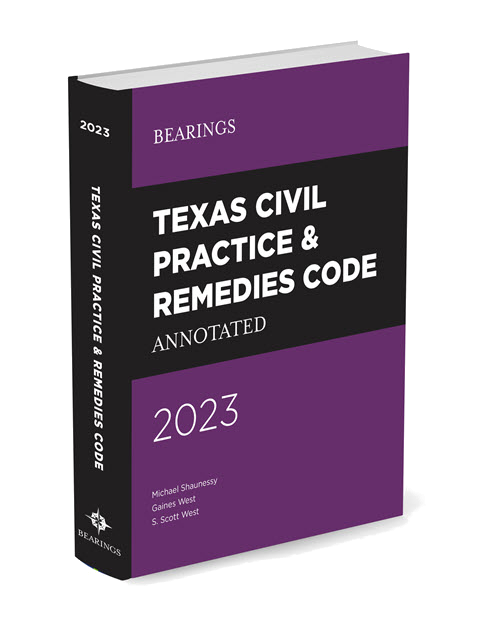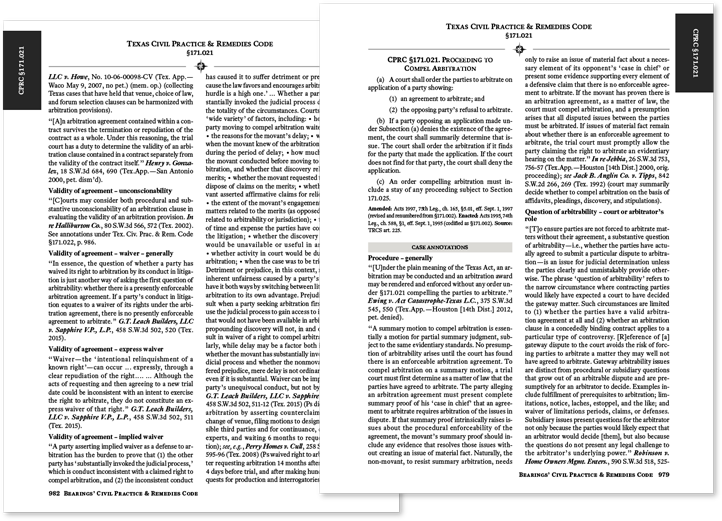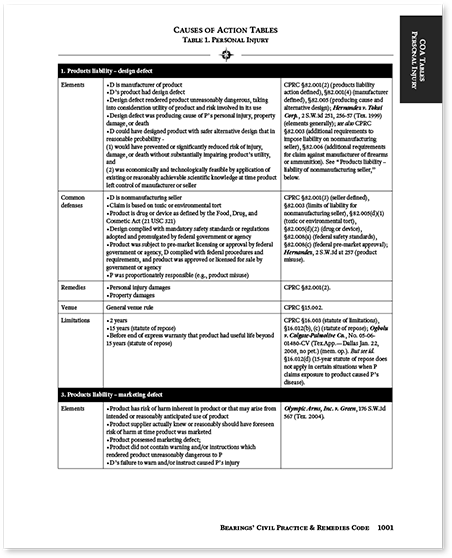
2023 Civil Practice & Remedies Code: Annotated
Ships Immediately!
A must-have for any civil practitioner, Bearings’ Texas Civil Practice & Remedies Code: Annotated includes the entire Texas Civil Practice & Remedies Code (CPRC), annotated with over 2500 court opinions to provide invaluable interpretive guidance of the code. The CPRC governs many of the critical aspects of civil litigation, including: (1) venue, (2) statutes of limitations, (3) declaratory judgments, (4) extraordinary remedies (e.g., injunctions, receiverships), (5) medical malpractice, (6) tort and governmental liability, (7) proportionate responsibility and contribution, (8) exemplary damages, (9) judgments, (10) settlement, (11) ADR, and (12) attorney fees.
To complement many of the topics covered in the CPRC, this single-volume guide also provides the following:
-
Select provisions from the following:
- Texas Constitution (e.g., court jurisdiction, liens & exemptions)
- Alcohol & Beverage Code (Dram Shop)
- Business & Commerce Code (DTPA)
- Finance Code (interest rates)
- Government Code (Code Construction Act)
- Insurance Code (DTPA tie-in statutes)
- Property Code (liens & exemptions)
-
NEW! 2023 Legislation.
- Over 160 legislative changes made to the CPRC
- 2023 Legislation at a Glance Table summarizing the legislative changes
- Causes of Action Tables. The Causes of Action Tables provide the elements, defenses, remedies, venue, and limitations for over 60 causes of action. At a glance, these tables allow you to quickly assess the facts of your case relative to the kind of suits you might bring or defend against.
-
CPRC Chapter 95 Flow Charts.
- Ch. 95 – Defendant’s Initial Burden
- Ch. 95 – Plaintiff’s Burden
In addition to over 2500 case annotations, Bearings’ Texas Civil Practice & Remedies Code: Annotated also provides the following features to enhance your understanding of the CPRC:
- Easy-to-read strike-through and underscoring of legislation
- Topical annotation headings to quickly find relevant annotations
- Excerpts from important bill analyses
- Cross-references to statutory definitions

- Efficient design. Indentations at every code-section level make the code accessible and easy to read.
- Friendly font. World-class Equity font—by Matthew Butterick—is specifically designed for legal writing and easy reading.
- Strike-through & underscore. Easy-to-read strike-through and underscoring of legislative changes help you quickly identify changes in the law and assess whether the changes impact your case.
- Excerpts from bill analyses. Excerpts from important bill analyses provide insight into the legislative intent behind the changes.
- Annotations. Direct quotations and summations from leading court opinions provide invaluable interpretive guidance for each rule.
- Topical annotation headings. Annotation headings save you time in locating the annotations that are relevant to your issues.
- Tables. The 2021 Legislation Sections-Affected Table ensures you’re always prepared.
- Tabs & headers. Tabs and headers expedite navigation.
- Cross-references to statutory definitions. Cross-references to applicable statutory definitions expedite interpretation and understanding of the CPRC section relevant to your case.
- Cross-references to rules and statutes. Cross-references to applicable rules and statutes help you make necessary connections between laws and rules impacting the CPRC section relevant to your case.
- History notes. Easy-to-read history notes help you identify former law and assess an older case's interpretive value.

the causes of action tables provide the critical information you need when assessing claims to bring and defend against. these tables provide you with a quick reference to all the critical components of a cause of action: elements, defenses, remedies, venue, and limitations. each component is supported with authority so you can jump-start your research. you won’t know how you practiced without it.



